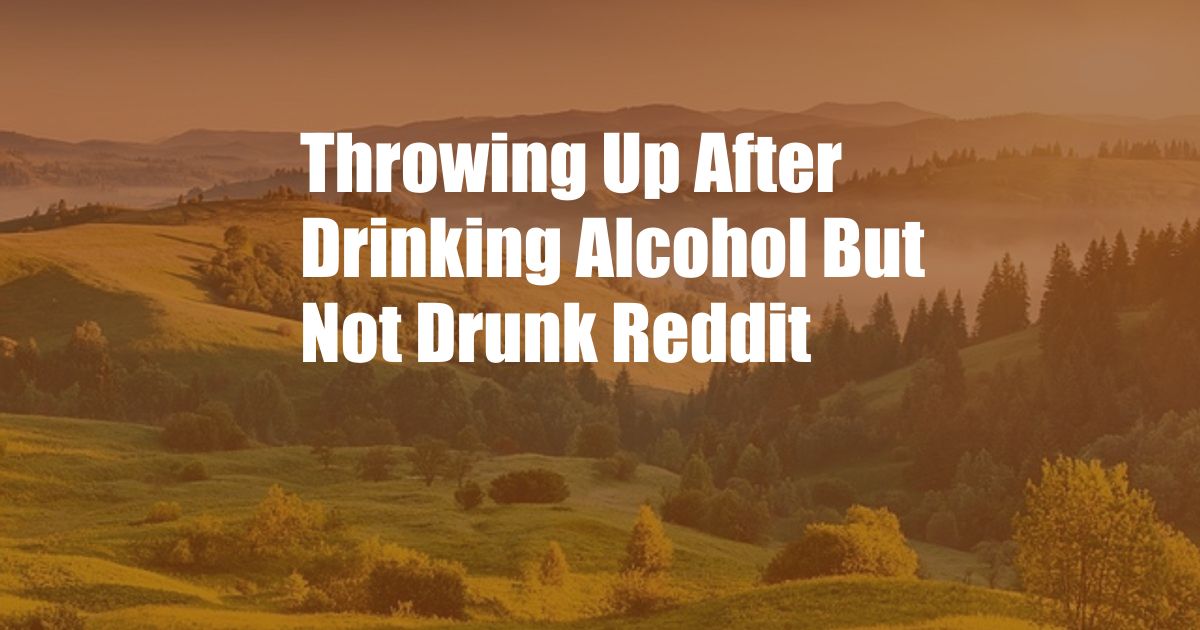
Throwing Up After Drinking Alcohol but Not Drunk: Understanding the Causes
After a night of revelry, it’s not uncommon to experience the unpleasant sensation of throwing up. But what if you’re not drunk? It’s a frustrating situation, and one that many alcohol drinkers have experienced. In this article, we delve into the potential causes behind throwing up after drinking alcohol but not being drunk.
Before we proceed, it’s essential to note that vomiting after drinking alcohol, even if not excessively, can be a sign of alcohol intolerance or an underlying medical condition. If you frequently experience this issue, it’s crucial to consult a healthcare professional for proper diagnosis and advice.
Gastric Irritation
Excessive alcohol consumption can irritate the lining of the stomach, triggering nausea and vomiting. Alcohol is a gastric irritant that disrupts the normal functioning of the digestive system, leading to inflammation and discomfort. This can occur even if you haven’t reached the point of intoxication.
Dehydration
Alcohol is a diuretic, meaning it causes the body to lose fluids. When you’re dehydrated, your body’s electrolytes become imbalanced, which can contribute to nausea and vomiting. Sipping on water or electrolyte-rich drinks throughout the night can help mitigate this effect.
Congeners
Congeners are impurities found in alcoholic beverages, particularly in darker liquors like whiskey and rum. These compounds can irritate the digestive tract, causing nausea and vomiting. Limiting your intake of these beverages or opting for lighter options can reduce the likelihood of these symptoms.
Histamine Release
Alcohol consumption can trigger the release of histamine, a compound that causes inflammation and can lead to nausea and vomiting. This is especially true for individuals with histamine intolerance or allergies. Avoiding alcohol or taking an antihistamine before drinking can help prevent this reaction.
Underlying Medical Conditions
In some cases, vomiting after drinking alcohol may indicate an underlying medical condition. Conditions such as gastritis, peptic ulcer disease, or pancreatitis can be aggravated by alcohol consumption and cause nausea and vomiting. If you experience persistent vomiting after drinking, it’s essential to seek medical evaluation to rule out any underlying issues.
Tips and Expert Advice
To minimize the risk of throwing up after drinking alcohol, consider these tips and advice from experts:
Pace Yourself
Avoid drinking too much alcohol too quickly. Give your body time to metabolize the alcohol and prevent overloading your system, which can lead to nausea and vomiting.
Stay Hydrated
Drink plenty of water or electrolyte-rich beverages before, during, and after drinking alcohol to stay hydrated and reduce the risk of gastric irritation and dehydration.
Choose Clear Liquors
Opt for clear liquors like vodka and gin, which contain fewer congeners compared to darker liquors. This can help reduce the risk of stomach irritation and nausea.
Eat Before Drinking
Having food in your stomach helps slow down the absorption of alcohol into the bloodstream, reducing the likelihood of nausea and vomiting. Eat a meal or snack before drinking to provide a buffer for your stomach.
FAQs on Throwing Up After Drinking Alcohol but Not Drunk
- Q: Is it common to throw up after drinking alcohol but not being drunk?
A: Yes, it’s relatively common and can be caused by factors such as gastric irritation, dehydration, congeners, histamine release, or underlying medical conditions.
- Q: How can I prevent throwing up after drinking alcohol?
A: Pace yourself, stay hydrated, choose clear liquors, and eat before drinking to minimize the risk of nausea and vomiting.
- Q: When should I seek medical attention for vomiting after drinking alcohol?
A: If you experience persistent vomiting, have severe pain or discomfort, or suspect an underlying medical condition, it’s essential to seek medical attention promptly.
Conclusion
Throwing up after drinking alcohol but not being drunk can be a frustrating and uncomfortable experience. Understanding the potential causes behind this issue can help you take steps to prevent it from happening. By following the tips provided in this article, you can minimize the risk of gastric irritation, dehydration, and other factors that can contribute to nausea and vomiting. Remember, if you experience frequent or persistent vomiting after drinking alcohol, it’s essential to consult a healthcare professional for proper evaluation and advice.
Are you interested in learning more about the effects of alcohol on the body?